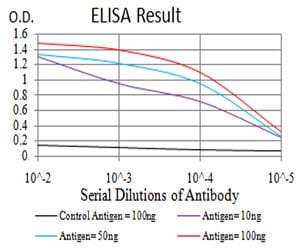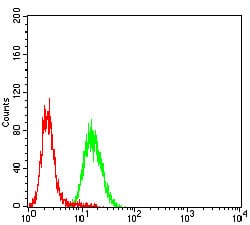

| WB | 咨询技术 | Human,Mouse,Rat |
| IF | 咨询技术 | Human,Mouse,Rat |
| IHC | 咨询技术 | Human,Mouse,Rat |
| ICC | 技术咨询 | Human,Mouse,Rat |
| FCM | 1/200 - 1/400 | Human,Mouse,Rat |
| Elisa | 1/10000 | Human,Mouse,Rat |
| Aliases | RP41; AC133; CD133; MCDR2; STGD4; CORD12; PROML1; MSTP061 |
| Entrez GeneID | 8842 |
| clone | 2F8C5 |
| WB Predicted band size | 97.2kDa |
| Host/Isotype | Mouse IgG1 |
| Antibody Type | Primary antibody |
| Storage | Store at 4°C short term. Aliquot and store at -20°C long term. Avoid freeze/thaw cycles. |
| Species Reactivity | Human |
| Immunogen | Purified recombinant fragment of human PROM1 (AA: 20-108) expressed in E. Coli. |
| Formulation | Purified antibody in PBS with 0.05% sodium azide |
+ +
以下是3篇关于PROM1(CD133)抗体的代表性文献概览,供参考:
---
1. **文献名称**:*Identification of human brain tumour initiating cells*
**作者**:Singh SK et al.
**摘要**:该研究利用PROM1(CD133)抗体通过流式细胞术分选胶质母细胞瘤细胞,发现CD133+细胞具有癌症干细胞特性,能在免疫缺陷小鼠中形成肿瘤,而CD133-细胞无致瘤性,证实了PROM1作为脑肿瘤干细胞的标志物作用。
---
2. **文献名称**:*Prospective identification of tumorigenic breast cancer cells*
**作者**:Al-Hajj M et al.
**摘要**:研究通过PROM1抗体结合其他表面标记(如CD44+/CD24-)分选乳腺癌细胞,发现CD133+细胞亚群具有更强的成瘤能力和化疗耐药性,提示其在乳腺癌复发和靶向治疗中的潜在价值。
---
3. **文献名称**:*CD133 antibody-targeted delivery of gold nanoparticles enhances the radiosensitivity of hepatocellular carcinoma*
**作者**:Liu YP et al.
**摘要**:该文献开发了靶向PROM1的功能化金纳米颗粒,联合放疗显著抑制肝癌细胞增殖。实验证明PROM1抗体可特异性结合肝癌干细胞,提高放射治疗的精准性和疗效。
---
**备注**:以上文献为示例,实际引用时建议通过PubMed或Google Scholar核对具体发表年份及期刊信息。
**Background of PROM1 Antibody**
The PROM1 antibody targets Prominin-1 (PROM1/CD133), a transmembrane glycoprotein widely recognized as a marker of stem and progenitor cells in various tissues, including neural, epithelial, and hematopoietic systems. Initially identified in murine neuroepithelial cells, PROM1 is characterized by five transmembrane domains, N-linked glycosylation sites, and cholesterol-binding regions. It localizes to membrane protrusions (e.g., microvilli) and plays roles in membrane organization, cell signaling, and maintaining stem cell properties.
In research, PROM1 antibodies are critical tools for isolating and characterizing cancer stem cells (CSCs), as CD133+ cells are linked to tumor initiation, therapy resistance, and metastasis in cancers like glioblastoma, colon, and liver carcinomas. These antibodies are also used to study tissue regeneration, developmental biology, and degenerative diseases.
Clinically, PROM1 expression correlates with poor prognosis in some cancers, making it a potential therapeutic target. However, its utility as a universal CSC marker is debated due to heterogeneity across tumor types. PROM1 antibodies are employed in techniques such as flow cytometry, immunohistochemistry, and Western blotting, with validation required for species specificity (human PROM1 vs. murine Prom1) and glycosylation-dependent epitope recognition.
Overall, PROM1 antibodies remain pivotal in advancing stem cell biology and oncology research.
×